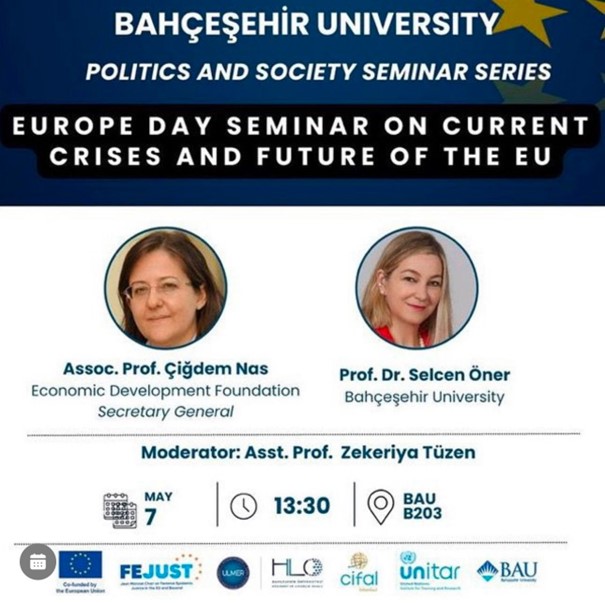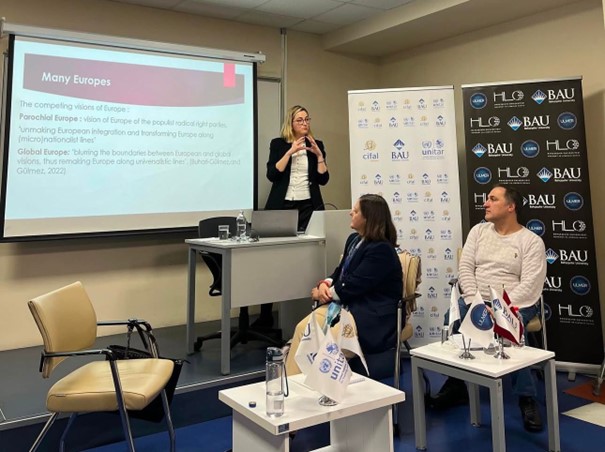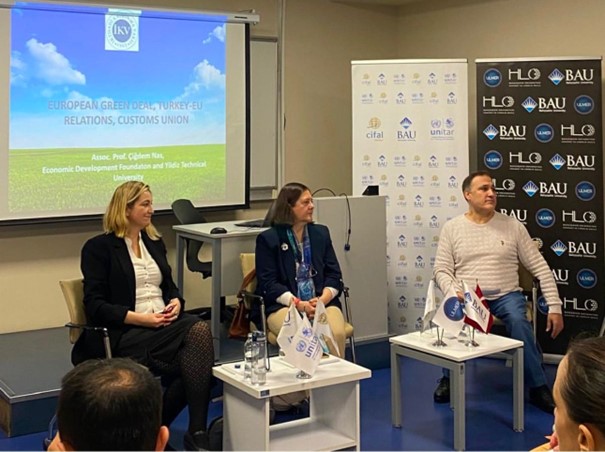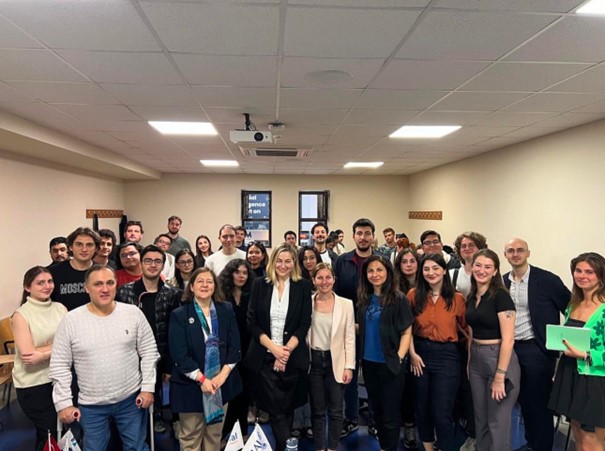Europe Day Seminar Summary
Title: Europe Day Seminar on Current Crises and Future of the EU
Date: May 9, 2024
Speakers: Assoc. Prof. Çiğdem Nas (Economic Development Foundation) and Dr. Selcen Öner (Bahçeşehir University)
Moderator: Dr. Zekeriya Tüzen

FEJUST had the honour of co-hosting an enlightening seminar “titled Europe Day Seminar on Current Crises and Future of the EU” in collaboration with CIFAL Istanbul, ULMER-HLO, and the BAU FEASS.
The Europe Day Seminar on Current Crises and Future of the EU marked the annual commemoration of the Schuman Declaration, which laid the foundation for European integration. Organized as part of the Jean Monnet Chair on Feminist Epistemic Justice in the EU, the seminar brought together distinguished scholars to discuss the EU’s responses to contemporary crises and the implications for its future. The event featured two presentations addressing the European Green Deal and the EU's evolving governance in light of geopolitical challenges, followed by an engaging discussion with an audience of academics, policymakers, and students.
About the Speakers
Çiğdem Nas is an associate professor of international relations and the Secretary-General of the Economic Development Foundation. She is a graduate of the Political Science Department of Bosphorous University and received her Masters degree on European social policy at the London School of Economics and Political Science. She completed her PhD on Politics and International Relations of the EU at the Marmara University EU Institute and worked at the same Institute as a researcher and
assistant professor between 1994 and 2007. She is a lecturer at the Yildiz Technical University since 2007 and has been working since that date also at the Economic Development Foundation which is an NGO dedicated to Turkey’s EU integration. Her research interests cover the European Union, European integration, European politics and Turkey and EU relations.
Selcen Öner is working as a full time Prof. at Bahçeşehir University (BAU) in Istanbul at the Department of Political Science and International Relations. She was a visiting professor at LUISS University in Rome and a visiting scholar at Free University of Brussels Institute for European Studies, University of Aalborg, Free University of Berlin and Pompeu Fabra University, IBEI. Her research interests include European identity, Turkiye-EU relations, EU migration policy, and populist radical right parties in European politics. She published a book called Turkey and the European Union: The Question of European Identity by Lexington Pub. (2011). Among her recent publications: “Europe of Populist Radical Right and the Case of Lega of Salvini: Pioneer of a Parochial Europe?”, European Politics and Society, Vol. 23, No.1, 2022. She is also the author of the book “Ne Seninle Ne Sensiz: Osmanlı’dan Türkiye Cumhuriyeti’ne Avrupa ile İlişkilerin Hikayesi” [Neither With You Nor Without You: The Story of Relations with Europe from the Ottoman Empire to the Republic of Turkey]
Overview of Presentations
Prof. Çiğdem Nas presented a comprehensive analysis of the European Green Deal, the EU’s flagship initiative aimed at achieving climate neutrality by 2050. She emphasized the dual role of the Green Deal as both a climate action strategy and a green growth model that seeks to transform the EU’s economy through sustainability and innovation. Key objectives include reducing carbon emissions by 55% by 2030 and integrating circular economy principles across all sectors.
Prof. Nas explored how the Green Deal represents a shift toward embedding climate goals into all EU policies, ensuring they align with sustainability targets. She highlighted the Fit for 55 package and the Carbon Border Adjustment Mechanism (CBAM) as pivotal tools to decarbonize the EU’s economy while preventing carbon leakage. The CBAM, which applies to imports in carbon-intensive sectors such as cement, steel, and aluminum, has significant implications for Turkey, given its trade ties with the EU.
Turning to Turkey, Prof. Nas discussed the country’s alignment with the EU’s climate agenda. She noted Turkey’s progress, including the ratification of the Paris Agreement and the adoption of a net-zero target for 2053. However, challenges remain, such as reliance on coal, insufficient climate financing, and the need for more robust governance mechanisms. She emphasized that the Green Deal’s regulatory framework could act as a catalyst for Turkey’s green transition, given its integration into the EU’s Customs Union and its dependence on EU markets.
Prof. Nas also addressed the broader implications of the Green Deal for global governance, emphasizing the EU’s aspiration to lead in climate action while maintaining strategic autonomy in energy and resource dependency.
Dr. Selcen Öner focused on the EU’s responses to multiple crises and the transformations these have triggered in its governance and identity. She explored how the EU has adapted to challenges such as Brexit, the COVID-19 pandemic, and the war in Ukraine, highlighting their collective impact on the EU’s pursuit of strategic autonomy and geopolitical influence.
Dr. Öner examined the rise of far-right and Eurosceptic parties, emphasizing their increasing influence on EU policymaking, particularly in migration and integration policies. She analyzed how mainstream political parties have adopted elements of far-right rhetoric to compete electorally, further complicating the EU’s efforts to uphold its liberal democratic values.
Addressing the EU’s enlargement policy, Dr. Öner highlighted the rapid candidate status granted to Ukraine and Moldova as a response to the war in Ukraine. She argued that these developments signal a shift toward flexible integration models that could redefine the EU’s accession processes. She emphasized the need for Turkey to closely monitor these changes, as they may offer lessons for revitalizing Turkey-EU relations.
Dr. Öner concluded with a discussion on the upcoming European Parliament elections in 2024, underscoring their significance in shaping the EU’s future trajectory. She warned that far-right parties could leverage these elections to gain greater influence over EU institutions, advocating for a less integrated and more intergovernmental Europe.
Significance for Feminist Epistemic Justice in the EU and Beyond
While this event was not explicitly focused on feminism, the topics discussed align closely with the pressing concerns of feminist standpoint epistemology. Issues such as the transformative potential of the European Green Deal and the political implications of geopolitical crises disproportionately affect women and marginalized communities. Climate change, for example, has well-documented gendered impacts, exacerbating vulnerabilities in areas like energy poverty, employment, and caregiving responsibilities. Similarly, migration policies influenced by rising far-right politics often overlook the specific challenges faced by women migrants and refugees.
The discussions underscored the importance of incorporating gender-sensitive perspectives into policy responses to ensure that these structural inequalities are addressed. The Jean Monnet Chair on Feminist Epistemic Justice in the EU (FEJUST) is proud to have co-organized this event, reinforcing its commitment to fostering inclusive and participatory approaches that prioritize the voices of those most affected by these critical issues. Through events like this, FEJUST continues to advocate for the integration of feminist insights into policymaking and academic discourse, ensuring that the EU’s responses to global challenges are equitable and just.
The event attracted 67 participants, concluded with a lively Q&A session, where participants explored topics such as the feasibility of Turkey’s net-zero target, the implications of the Green Deal for Turkish industries, and strategies for countering the rise of far-right parties in the EU. Attendees praised the speakers for their detailed analyses and actionable insights, emphasizing the relevance of these issues for both the EU and Turkey



Discussions also highlighted the importance of Turkey’s adaptation to the EU’s evolving regulatory landscape, particularly in trade and climate policies, and the potential for renewed dialogue on Turkey-EU relations.
The Europe Day Seminar on Current Crises and Future of the EU offered a timely and critical reflection on the EU’s responses to contemporary challenges and its implications for Turkey-EU relations. Organized under the Jean Monnet Chair on Feminist Epistemic Justice in the EU, the event showcased the intersection of global governance, climate action, and political transformations, providing valuable insights for academics, policymakers, and civil society. The discussions underscored the importance of resilience, collaboration, and inclusivity in shaping the future of the EU and its partnerships.